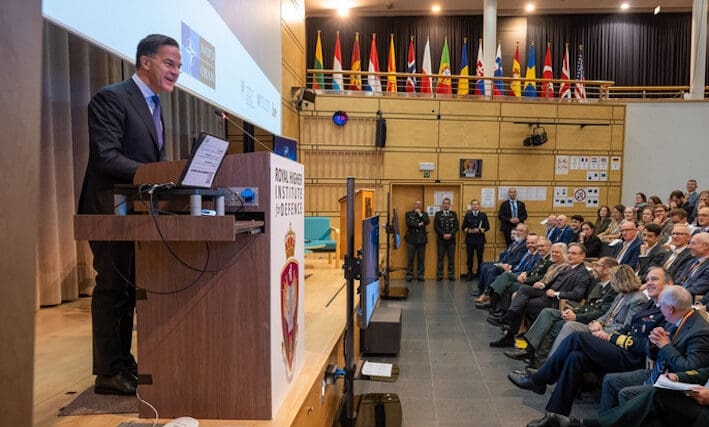
NATO elevates biotech to defence priority
The NATO is clearly priorising biotech to a defence priority with an annual budget of potentially up to €500m for biotech start-ups starting from 2026. At the opening of the first ever NATO Biotechnology Conference, NATO Secretary General Mark Rutte said: “Between last year and this year, we funded a total of 28 promising biotechnology companies through the Defence Innovation Accelerator for the North Atlantic (DIANA)”. Rutte indicated that DIANA’s budget could grow significantly in the medium term, potentially up to five-fold.
For the first time ever NATO Secretary General Marc Rutte has called biotechnology a strategic priority, focusing on human enhancement, telemedicine, military sensor systems, and trauma and infection diagnostics. DIANA currently supports 28 startups, providing early-stage seed funding. Germany, with a projected defence budget of approximately €108bn for 2026 including special funds, is a central actor in the European defence and innovation ecosystem.
Money for biotech start-ups
DIANA is actively funding innovative biotech start-ups that can deliver dual-use technologies for NATO. In the field of human enhancement, 52 North Health from the UK develops wearable sensors to monitor soldier fatigue and infections. In telemedicine and point-of-care solutions, US-based Swaza is creating nanofluid breathing aids for trauma care. For military sensor systems, Germany’s DeltaOrbit GmbH works on cryogenic propulsion systems for satellites, demonstrating how dual-use technologies span both defence and civilian applications.
Rutte emphasised that biotechnology is as critical as conventional weapons systems. NATO seeks dual-use technologies that serve both military and civilian purposes. In his speech, Rutte also highlighted geopolitical pressures: China and Russia are advancing military biotech rapidly. NATO and the EU aim to stay technologically competitive and strategically responsive.
Financially, seed funding of €0.5 to 5m per startup is realistic, while larger infrastructure or consortium projects could receive €50m to 100m annually. NATO is strategically investing, and companies capable of rapidly operationalising dual-use technologies stand to benefit immediately, while future increases remain speculative.
For biotech firms, early expertise in human enhancement, telemedicine, or military sensor technologies could unlock NATO and EU funding opportunities. The conference underlines that biotechnology is now a core pillar of modern defence and security strategies, not just a niche field.
Push for industrial biotech?
Besides this focus, the EU and innovation agencies such as SPRIND focus on industrial biotech applications that improve Europe’s supply chain resilience, i.e. by funding companies that offer design of chassis organisms or cell-free enzyme cascades able to recycle rare earths from electronic waste or sustainable production of novel materials. In the latest biotech report of the Spanish biotech assocation, Asebio Chair Rocío Arroyo indicates that China currently invests about US$4bn in industrial biotechnology, with applications including recycling rare earth elements, using CO₂ as a raw material, and producing new materials.


 Picture from Ferdinand Stöhr on Unsplash
Picture from Ferdinand Stöhr on Unsplash  Photo from Giulia Bertelli on Unsplash
Photo from Giulia Bertelli on Unsplash  Stifel
Stifel